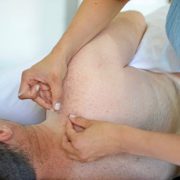What is Dry Needling?
At CJ Physical Therapy and Pilates, our goal is to help you live a pain-free life without pain pills or invasive procedures.
Trigger Point Dry Needling is one of several strategies we use to treat muscles that are extremely tense and in spasm. The spasm causes the muscle to be in constant tension which reduces blood flow, decreases oxygen, and can produce fibrotic unhealthy tissue over time (scarring). When a physical therapist inserts the very thin acupuncture needle (dry needle) into a knotted up muscle, it creates a local twitch reflex. Research shows that this not only relaxes the muscle, it breaks up the pain cycle by improving blood flow and oxygen to the muscle. This whole process helps to reduce and normalize inflammation in the area to promote healing. However, dry needling is not necessary for everyone, so it’s important that you know what it is and when it can be used to improve your health! Here’s our advice when it comes to pursuing dry needling treatment.
Work with a physical therapist to use dry needling in conjunction with movement based rehabilitation.
Dry needling can work wonders to relax your muscles. However, they’re just going to get tense and damaged again if you don’t learn how to use them properly and address any movement dysfunction that may be occurring. You don’t want to think of it as a quick fix! Dry needling is just the first step for some individuals who aren’t able to begin a physical therapy or movement regimen without first breaking up the pain cycles in the muscles that are prohibiting healthy movement. Dry needling serves as a “helper” to relax those muscles – and should be integrated with physical therapy treatment and strengthening activities such as Pilates.
Don’t be afraid of trying dry needling!
It can be uncomfortable for some people, but others say they feel no pain at all. It’s not dangerous and has lasting positive effects when used in conjunction with hands-on physical therapy under the direction of a specialist. Furthermore, our clients love it:
“After two back surgeries in my 20s and a new hip at 58, I figured I was lucky just to be walking. Dry needling has transformed the way I move. I’m more flexible. My walking stride has more length and I can stand longer.” – John
Do you have questions about dry needling? Want to see what a specialty physical therapy practice can do for you? We offer FREE Discovery Sessions right here in Portsmouth that give you the opportunity to ask any questions you may have! It’s a completely free, no-obligation appointment that will give you all the information you need to make the BEST decision for YOUR health. All you have to do is fill out this quick form, and we’ll be in touch!


